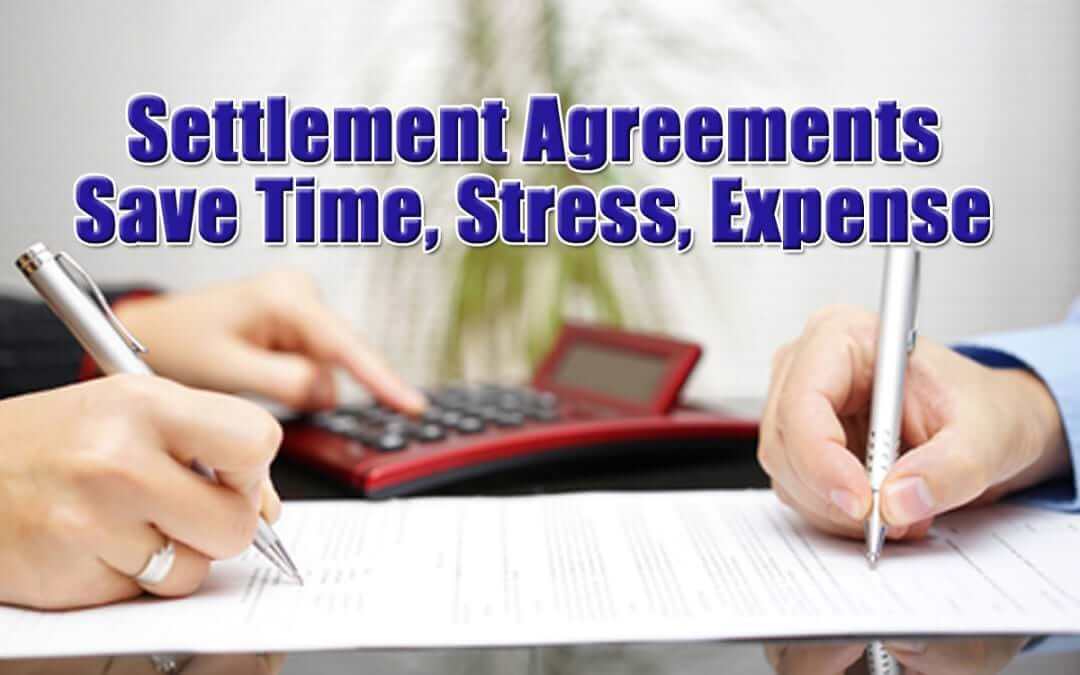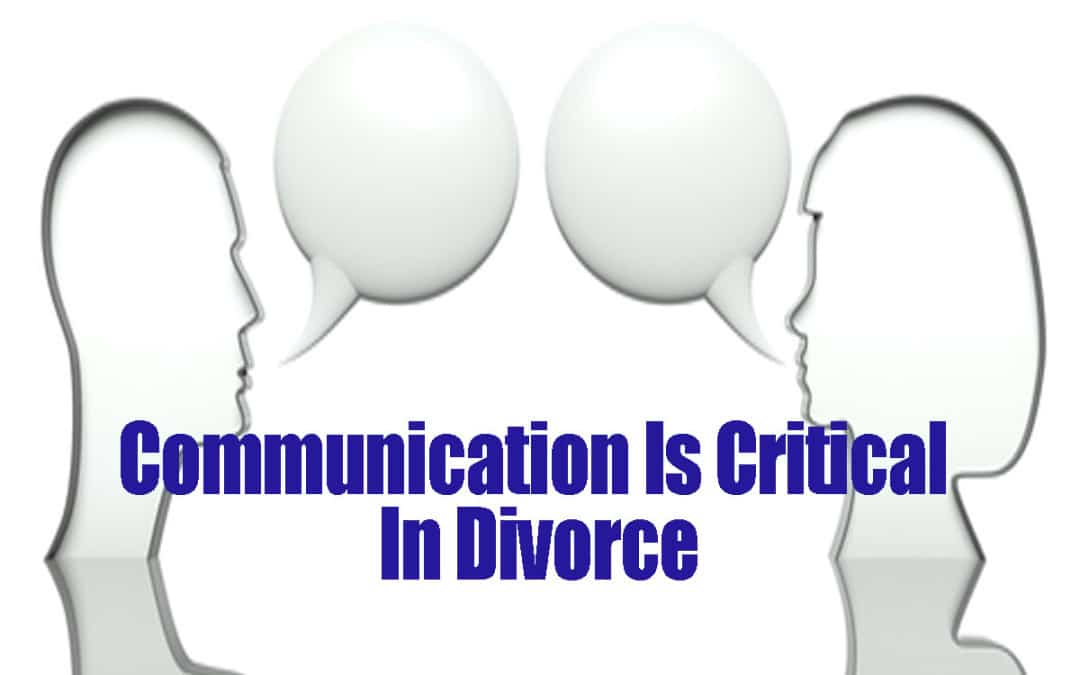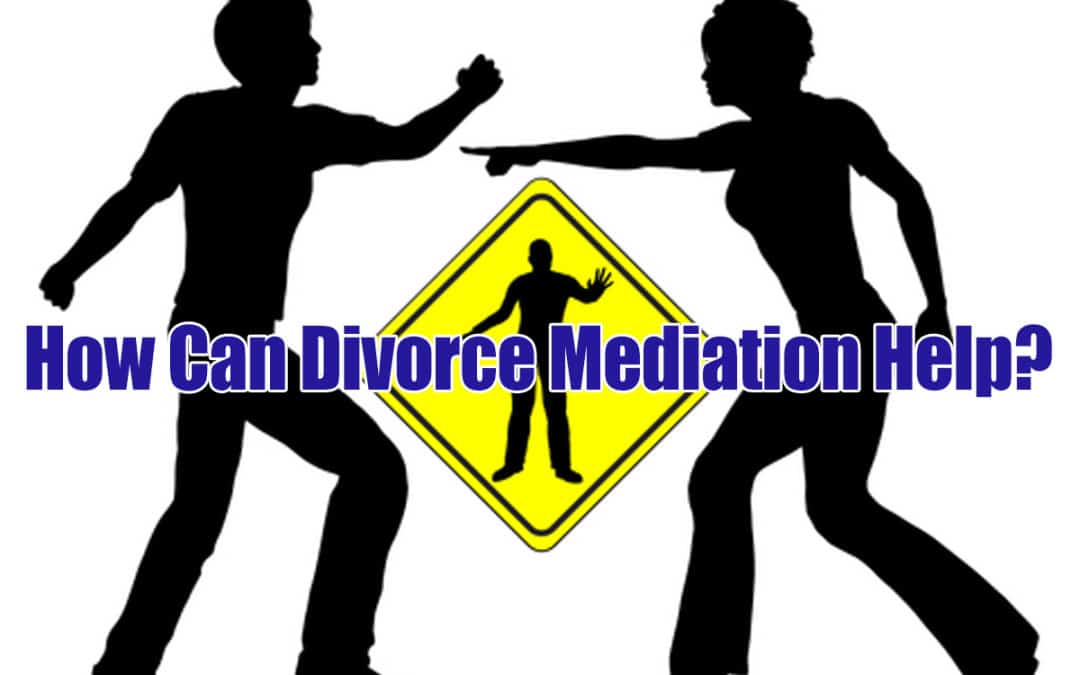
by Robert E. Hornberger, Esq | Apr 25, 2017
Many unmarried couples on Long Island are unaware that they can utilize divorce mediation to sort out their affairs when they break up. In New York and in many other states, divorce mediation can be used for unmarried couples as well as for those who are married. In fact, it is increasingly common that couples who never married seek the services of a divorce mediator to resolve the issues in their breakup. Mediation can help to avoid the time and expense of taking an ex to court to assert your rights to certain property or over your children in common.
(more…)

by Robert E. Hornberger, Esq | Nov 22, 2016
As a Divorce Mediator and Collaborative Law Attorney on Long Island, I have found that many people have questions about the difference between Divorce Mediation and Collaborative law and which one might be best for their particular situation.
If you are contemplating or preparing for divorce, it is important to understand that there are several options available to you. Divorce is not always the horrible, volatile legal battle that many believe it to be. Instead, there are options like Divorce Mediation and Collaborative Divorce that have been developed as a way to circumvent a lengthy, expensive, and exhausting court battle between you and your soon-to-be ex-spouse. (more…)
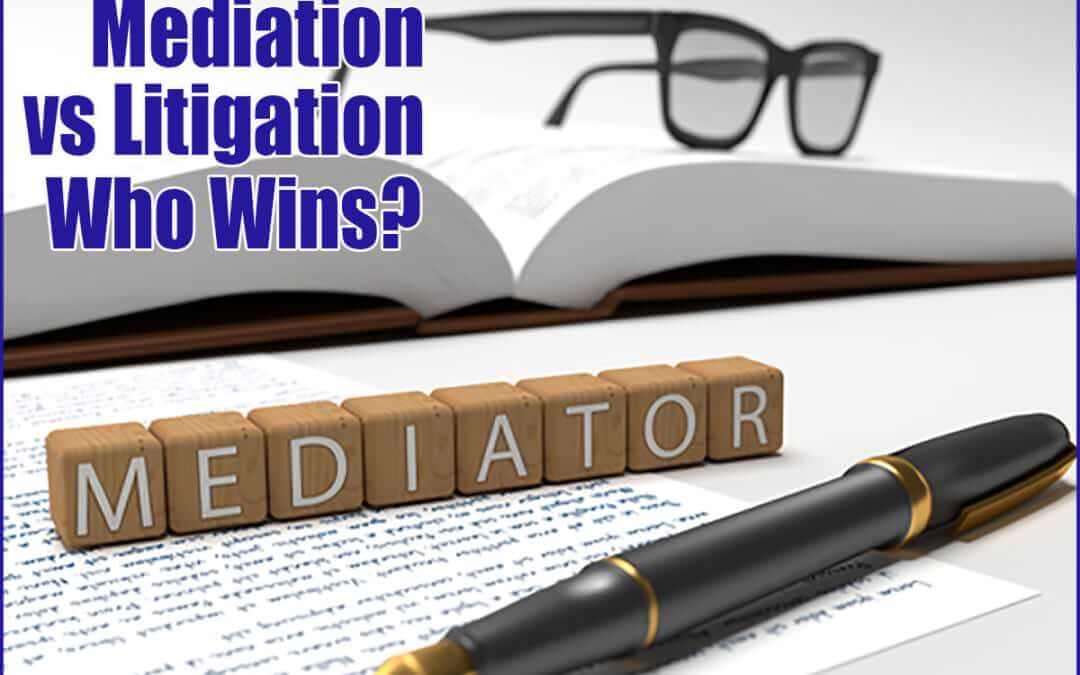
by Robert E. Hornberger, Esq | Nov 3, 2015
As a Long Island divorce mediator and divorce attorney, I always look for the best solution to legally resolve my clients marital status. By “best”, I mean the one that will allow them to move forward with their lives as individuals with the least stress, least economic impact (least expensive) and in the least amount of time (which translates to less cost and stress as well). In cases where the spouses are able to communicate effectively and negotiate the terms of their divorce, this is often divorce mediation as opposed to divorce litigation.
If you are considering a divorce, or in the middle of a divorce in New York, you may be wondering about divorce mediation and whether there are any benefits of mediation over an adversarial divorce proceeding. A divorce attorney in Nassau County or Suffolk County may be able to help you get through your divorce with more confidence and less stress and less expense by utilizing divorce mediation rather than divorce litigation in a courtroom in Nassau County of Suffolk County.
The end of a marriage can be an unimaginably stressful time and can rock the worlds of the spouses and children involved. The process of divorce raises questions about division of property and rights that the couple never imagined as potential issues. Divorce litigation can become a battle of the wills. It is not uncommon that two people who once loved each other can become bitter and threatening, resulting in an extended tug of war that lasts longer than their courtship before marriage.
Divorce mediation on Long Island is an excellent method of reducing the time, cost, and stress involved in a Nassau County or Suffolk County divorce. The differences between mediation and litigation can be tremendous. Divorce mediation allows both spouses to come before a neutral, skilled divorce mediator whose goal is to address questions, concerns and assist the parties in coming to an agreement. The divorce mediator will help the both spouses learn to identify, address and successfully resolve the legal matters which are presented by their divorce in a non-confrontational or threatening way. Issues such as child custody and care, division of assets, financial support and many others are often best resolved in a cooperative, goal oriented atmosphere rather than by an adversarial fight. Furthermore, because a divorce mediator does not represent either spouse, he or she has all the tools to help couples facing a divorce in Nassau County or Suffolk County come to a mutual agreement while saving time and money.
Divorce mediation can be a far less stressful process than divorce litigation. In a neutral setting, the parties can work out the details of the divorce agreement and maintain some control over the outcome, rather than having two opposing divorce attorneys battle it out in court. Parties are often surprised how many details can be worked out in a mutually agreeable fashion in divorce mediation.
Of course, divorce is never pleasant, and mediation cannot take the emotional pain away. However, mediation can greatly reduce the amount of stress placed upon the family by offering a supportive and cooperative forum for problem solving. Parties are assisted in maintaining a smart, practical state of mind in the decision-making and compromise process, rather than allowing resentment and other emotions get the best of them. The goal of mediation is to come to an agreement by which both parties can successfully move forward with their lives after this life-changing event. Children of the couple are also great beneficiaries of this method of divorce as their parents are not at each other’s throats during the divorce, which leads to better communication regarding child-rearing after the divorce.
For example, the care and custody of the children can be especially difficult for parties to agree upon. Common sense may indicate that the best interests of the children would be found in reaching a mutually agreeable plan, but parents are often unwilling to budge in this area. A Divorce Mediator in Nassau County or Suffolk County may be able to reframe the issue within the framework of smart parenting and the children’s best interests, and shift the focus away from divorce adversaries who each want to “win.” In fact, if the parents go through divorce litigation, the outcome will be completely unpredictable, and a judge will tell them when and for how long they can see their children. If parties are able to use reason and compromise as tools to support the post-divorce family, they will have far more control over the outcome. Usually, this results in a more peaceful and balanced set of circumstances for the parents, children and extended family after the divorce is finalized.
On the contrary, contested divorce litigation places the decision making in the hands of a Nassau County of Suffolk County court. The parties each present their case through a trusted attorney, and then must surrender control to the hands of the judge to determine what is best for their family. An adversarial divorce proceeding usually results in increased costs, litigation, a lengthier process, loss of privacy in some sensitive matters, and can have unpredictable results, all in addition to the pain of a broken marriage.
There are no winners in divorce litigation. Even if one party receives greater financial or child custody results in court, that party still must face the post-divorce family dynamic, especially if there are children involved. Divorcees often realize that, after all is said and done, the family would have better been served by care and consideration for each family member, including the ex-spouse. Learning to engage in divorce mediation in the context of divorce can set the tone for future family interactions that may be inevitable throughout the parties’ lifetimes. Even if you feel there is only a slight possibility that litigation can be avoided in your particular divorce circumstances, mediation is certainly worth a try.
To learn more about Divorce Mediators on Long Island and how they can save you time, money and stress, visit this page: Divorce Mediator Long Island | Nassau County & Suffolk County. A Long Island divorce mediator who is also a divorce attorney can best help you decide if divorce mediation or divorce litigation is the best route to end your marriage while protecting your and your family’s rights and interests. Reach out to the Law Offices of Robert E. Hornberger, Esq. at 631-923-1910 for a free confidential consultation, or fill out the form on this page and we’ll get right back to you.
Download our Free New York Divorce Guide
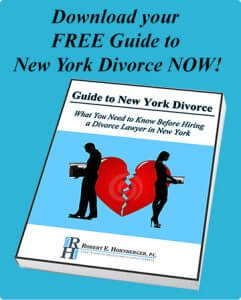 Our 41-page “Guide to New York Divorce: What You Need to Know Before Hiring a Divorce Lawyer in New York” written by an experienced divorce lawyer Long Island’s Robert E. Hornberger, Esq., provides you with real information on the divorce process and the laws it rests upon in the state of New York. This book will help give you a solid foundation upon which you can begin the process of making your family’s, life better. Download your Free Guide to New York Divorce here.
Our 41-page “Guide to New York Divorce: What You Need to Know Before Hiring a Divorce Lawyer in New York” written by an experienced divorce lawyer Long Island’s Robert E. Hornberger, Esq., provides you with real information on the divorce process and the laws it rests upon in the state of New York. This book will help give you a solid foundation upon which you can begin the process of making your family’s, life better. Download your Free Guide to New York Divorce here.
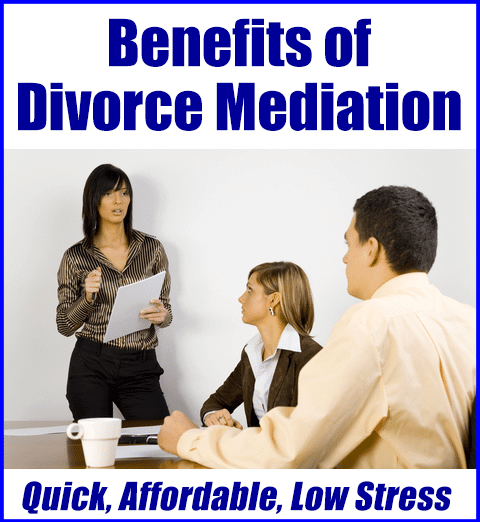
by Robert E. Hornberger, Esq | Jun 30, 2015
A divorce in Nassau County or Suffolk County on Long Island does not have to be adversarial; it does not even have to involve stepping one foot into a courtroom. If you and your spouse can work together and are seeking a Long Island divorce without the time, expense and stress of judges, lawyers and monthly court conferences, the best avenue for you is likely divorce mediation. It will save you time, money and stress on you and your family. Your divorce will be settled faster, less expensively and with much less anxiety and acrimony than if you litigate your divorce in a Nassau County or Suffolk County courtroom.
Divorce Mediation, Long Island’s Robert E. Hornberger, Esq. explains, is a process in which you and your spouse will mutually agree upon an individual (often, but not always, a Long Island divorce lawyer) to help mediate your divorce. This amicable process allows you and your spouse to maintain a healthy relationship during, and after, your Long Island divorce.
Different entities offer different programs for divorce mediation on Long Island. However, most typically offer sessions in two (2) hour time frames. Depending upon the complexity of your divorce and the issues to be resolved, you may opt to participate in one (1) two-hour divorce mediation session, or two (2) two-hour sessions. The process is completely individualized to work best with the wants and needs of you and your spouse. If you are aware you and your spouse may enter into an agreement that strays from the norm, consider contacting a divorce mediator on Long Island to work out an agreement that will work for you and your spouse.
During your divorce mediation session, your mediator, who may or may not be a divorce attorney, will educate you and your spouse of the state of the law as it pertains to your divorce. It is important to be aware that the mediator does not represent you or your spouse, and he or she is not permitted to give you legal advice. In other words, your divorce mediator cannot tell you if you are making a bad deal. He or she is there to help you and your spouse come to an agreement on the particulars of your divorce in an amicable, non-confrontational way and to make sure all the legal Ts are crossed and the Is dotted in your final divorce agreement. If you have any concerns about the agreement you have worked out with your divorce mediator, you are free to retain an independent attorney to review the agreement before you sign it. As a Long Island divorce attorney, I have reviewed numerous mediated divorce agreements for clients and sent back requests for comments and revisions to the mediator.
A divorce mediator cannot mediate your Long Island Divorce without the consent of both you and your spouse. In my experience, this is the only difficult aspect of divorce mediation, as you and your spouse may have difficulties in agreeing upon whose services to utilize. You may interview one or 20 divorce mediators before you find one who suits you, but in order for the process to work effectively you must both be comfortable with your mediator. Additionally, if you meet with the mediator individually prior to bringing your spouse, the mediator must inform your spouse of your initial meeting. If you are looking for an expert in divorce mediation, Long Island’s most reliable choice is Robert E. Hornberger, Esq.
One of the benefits of divorce mediation is the absence of two divorce attorneys fighting each other for the rights of their clients. While this can be necessary in complex, adversarial divorces it necessarily drives up the cost and length of time to complete the divorce. While not all divorce mediators are attorneys, some Long Island Divorce Attorneys, myself included, also act as divorce mediators. Your desire to avoid attorneys may have drawn you to divorce mediation, but having a divorce attorney as your mediator should not cause you concern.
Your divorce mediator’s only role is to inform you and your spouse of the law and to assist you in reaching a mutually agreed upon divorce settlement. Having an experienced and practicing divorce attorney as your divorce mediator offers you the benefit of ensuring they are current with regard to all the applicable laws surrounding your divorce on Long Island. If the mediator’s sole purpose is to inform you of the law, wouldn’t you want a divorce mediator who is skilled in that applicable area of law?
Long Island’s Robert E. Hornberger, Esq. often tells clients with children that if they do not agree on the issue of child custody, mediating their divorce may not be simple. Divorce mediation requires the parties to cooperate and mutually reach an agreement. Because the cost of your mediation is based upon the time you spend with your mediator, it is best for you if the most difficult issues are agreed upon before-hand your session/s with your mediator. It is easy to mediate which party will retain the dining room furniture, but it can take the entire two (2) sessions to mediate which party will have residential custody of the children.
In fact, if you and your spouse already have a settlement agreement, or you have a general idea of a settlement agreement, you are the perfect mediation clients. In such instances you may even require only one (1) session, and the terms of your divorce can be finalized in as little as two (2) hours.
To learn more about Divorce Mediation on Long Island and how it can save you time, money and stress, visit this page: How Divorce Mediation Works and its Benefits for Families in Nassau, Suffolk, Long Island. If you have questions about whether divorce mediation is right for you and your spouse, consult with an experienced Long Island divorce mediator and attorney. Long Island’s Robert E. Hornberger, Esq., PC’s compassionate and experienced divorce mediators can help. Call us at 631-923-1910 for a complimentary, confidential consultation or fill out the short form on this page and we’ll get right back to you.
For more information, visit our Comprehensive Guide to Long Island Divorce Mediation.
SCHEDULE YOUR FREE CONSULTATION TODAY
Call 631-923-1910 or fill in the form below

Schedule your complimentary consultation and case evaluation with our experienced attorneys today. When you call, you’ll speak to our friendly Client Services Director, who will be able to answer your general questions and set up your appointment with an attorney who specializes in your unique case.
At your meeting, your attorney will describe the many options available and determine together which is the right solution for you. By the end of this meeting we’ll all understand how we can best help you to move forward.
No Cost or Obligation
There is no cost or obligation for this initial consultation. It is simply an opportunity for us to get to know each other, answer your questions and learn if Hornberger Verbitsky, P.C. is the right law firm for you.
by Robert E. Hornberger, Esq | Feb 18, 2014
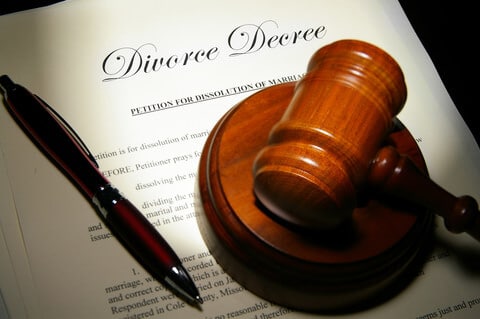 If you and your soon to be ex-spouse have decided to use divorce mediation as your method of divorce resolution you both may be wondering what role, if any, a divorce attorney plays in the mediation itself. You are not required to have a divorce attorney mediate your divorce, but you and your partner may decide to hire divorce attorneys to assist you both in the process of divorce mediation if your mediator is not also a divorce attorney. Because you know that you and your partner control the negotiating process during divorce mediation, you may be wondering what role, if any, a divorce attorney can play throughout the process.
If you and your soon to be ex-spouse have decided to use divorce mediation as your method of divorce resolution you both may be wondering what role, if any, a divorce attorney plays in the mediation itself. You are not required to have a divorce attorney mediate your divorce, but you and your partner may decide to hire divorce attorneys to assist you both in the process of divorce mediation if your mediator is not also a divorce attorney. Because you know that you and your partner control the negotiating process during divorce mediation, you may be wondering what role, if any, a divorce attorney can play throughout the process.
Before you and your partner even decide upon divorce mediation, either one, or both, of you may have consulted a divorce attorney. If you are considering the idea of using a divorce attorney in addition to your divorce mediator, it is best to consult this attorney in the beginning stages of the process. The divorce attorney can fully explain what divorce mediation is and what it entails, which may make it easier (or more difficult) to choose mediation. If your divorce attorney is not practiced in divorce mediation, he or she may also be able to recommend divorce mediators, however, you should be aware that divorce attorneys who are not also divorce mediators are more likely to steer you away from divorce mediation simply to earn your business for their practice.
If you do consult a divorce attorney during the initial stages of your divorce mediation, you may wish to keep this divorce attorney throughout the entire process. This attorney may advise you of the law in certain areas, help you review any agreement before you sign it, and eventually prepare the final documents that will be entered with the court so your divorce can be legalized.
Of great importance during the divorce mediation process is the fact that the divorce attorney should not speak for you or your partner. Rather the divorce attorney is present during the mediation as an advisor and support system. If you find yourself confused about parts of the mediation agreement or are undecided about what may be the right decision, you have the option to discuss the matter with the divorce attorney in private. He or she may make suggestions or just simply serve as a listening ear for you to discuss the issue aloud with someone and hopefully be able to reach a conclusion with which to go back to the mediation. Additionally, you may be willing to enter into agreements during the mediation without realization of the risks involved. The divorce attorney is able to explain these risks to you, and help you weigh them against the benefits to make the best decision possible.
Once you have decided to hire a divorce attorney to assist you during your mediation process, you may naturally be wondering if he or she will attend every mediation session with you. Like most other decisions during the divorce mediation process, this is a personal choice that you will discuss with your divorce attorney. Keep in mind that your divorce attorney will need to be compensated for his or her time, so the more sessions your divorce attorney has to attend, the larger your legal bill.
If you feel confident in your wants and desires and your ability to clearly communicate these to your partner and the mediator, you may decide to speak to your divorce attorney only before and after the mediation sessions. On the other hand, if you feel as though you may get overwhelmed and need to step out of the room and have someone there to talk with so you can vocalize your thoughts, you may decide to have your divorce attorney accompany you to every divorce mediation session. However, if your divorce lawyer does attend the mediation, it is important to remember that he or she is not there to participate in and make arguments for you. Rather, he or she is there solely for guidance and support, and as a potential legal advisor.
If your divorce mediator is not a divorce attorney, once you and your partner reach an agreement in your mediation, your attorney will review that agreement, and potentially prepare the finalized documents for the court. This way, you will be reassured that the agreement is valid and enforceable.
As you might imagine, having a separate attorney in addition to your divorce mediator is going to add to your legal bills. The less expensive alternative is to find a divorce mediator who is also an experienced divorce attorney, familiar with the latest developments in divorce law and practice. This kind of mediator will be able to advise you as to the legal ramifications of any agreements reached during your mediation at the mediation, and not in a separate session with an outside divorce attorney.
To learn more about Divorce Mediation on Long Island and how it can save you time, money and stress, visit this page: How Divorce Mediation Works and its Benefits for Families in Nassau, Suffolk, Long Island. If you would like to learn more about Divorce Mediation on Long Island, call the divorce law firm of Hornberger Verbitsky, P.C. at 631-923-1910 or fill out the short form on this page for a complimentary divorce mediation consultation. The compassionate divorce lawyers at the firm are skilled at all methods of divorce resolution, including litigation, mediation and collaborative divorce.
For more information, visit our Comprehensive Guide to Long Island Divorce Mediation.
SCHEDULE YOUR FREE CONSULTATION TODAY
Call 631-923-1910 or fill in the form below

Schedule your complimentary consultation and case evaluation with our experienced attorneys today. When you call, you’ll speak to our friendly Client Services Director, who will be able to answer your general questions and set up your appointment with an attorney who specializes in your unique case.
At your meeting, your attorney will describe the many options available and determine together which is the right solution for you. By the end of this meeting we’ll all understand how we can best help you to move forward.
No Cost or Obligation
There is no cost or obligation for this initial consultation. It is simply an opportunity for us to get to know each other, answer your questions and learn if Hornberger Verbitsky, P.C. is the right law firm for you.
by Robert E. Hornberger, Esq | Feb 11, 2014
 Your Long Island Divorce is a difficult, emotional task, regardless of the current status of your relationship with your soon to be ex-spouse. Before you make any decisions concerning how you want to handle the process of the divorce itself, the topic of divorce mediation may be of interest to you.
Your Long Island Divorce is a difficult, emotional task, regardless of the current status of your relationship with your soon to be ex-spouse. Before you make any decisions concerning how you want to handle the process of the divorce itself, the topic of divorce mediation may be of interest to you.
As you likely know, the typical way to handle a divorce is for both you and your partner to hire your own independent divorce attorneys and utilize the Nassau County or Suffolk County court system. As you are also likely aware, handling a divorce this way can become a grueling, emotionally draining experience. The divorce can weigh even more on your emotions if the two of you have children, or even beloved pets, together. Did you know it doesn’t have to be this way? If you find yourself in such a situation, divorce mediation may be of interest to you as an inexpensive, less stressful, lest time-consuming, yet no less thorough and legally binding alternative method of achieving your divorce.
Take Control; Don’t Let the Courts Decide Your Fate
If you find yourself facing an impending divorce, do not hesitate to inquire about divorce mediation before settling on Litigating through the Nassau or Suffolk County court systems. Divorce mediation allows you and your soon to be ex-spouse to control the divorce process. You will be free to discuss the divorce on your own accord without the fear of the court imposing what it thinks is best for you and your family.
In divorce mediation, your mediator will be a neutral third party who will monitor and guide the process, not impose his or her will on your divorce. Divorce mediators do not make decisions for you like a court judge may do, but will follow your lead in how you want your divorce to be settled. Generally, the mediator will meet with both you and your partner together to determine both of your wants and needs. In some cases, or at certain times in the process, the mediator may also meet with your and your soon to be ex-partner individually.
Your Wants & Needs Will Be Heard by Divorce Mediator
Because divorce mediation requires you and your partner to vocalize your wants and needs, you need to make sure that you are both comfortable discussing the divorce. While divorce mediation is by no means a form of therapy, it does require that you and your partner express your desires aloud to each other and the mediator. There may be times during the negotiation process where you and your partner do not agree, but you both must be willing to compromise with and understand each other. In many cases, these issues include matters such as child custody, the value of your home, or who gets the living room furniture. While you should enter divorce mediation with a set of goals in mind, it is important to be aware that you have to be open-minded.
Your divorce mediator will be there to assist in settling power imbalances if it seems that either you or your partner are controlling the discussions. This is a completely different setting than if you were to each hire divorce attorneys and take the traditional court system route, where you would express your wants in private to the divorce attorney who would then fight for what he or she felt would best achieve those goals. If you and your soon to be ex-spouse are not willing to negotiate on issues of disagreement to find a happy medium divorce mediation may not be the best solution for you.
Again, the court system has little to no involvement in the process of divorce mediation. Therefore, you may be wondering what happens if you and your partner decide upon divorce mediation, negotiate and sign an agreement, but then your partner fails to follow through on his or her promises. In order for you and your partner to be legally divorced, a judgment of divorce must be entered into the court system. So while the courts play no role in the actual negotiation of the agreement during divorce mediation, you will still file the judgment of divorce within the court. Attached to that judgment would be your mediation agreement which will be on file with the court system. If you find that your ex-spouse has failed to uphold his or her portion of the divorce mediation agreement, the court has the power to enforce it, just the same as it has the power to enforce a traditional divorce agreement reached through the court system itself.
To learn more about Divorce Mediation on Long Island and how it can save you time, money and stress, visit this page: How Divorce Mediation Works and its Benefits for Families in Nassau, Suffolk, Long Island. If you would like to learn more about Divorce Mediation on Long Island, call the divorce law firm of Hornberger Verbitsky, P.C. at 631-923-1910 or fill out the short form on this page for a complimentary divorce mediation consultation. The compassionate divorce lawyers at the firm are skilled at all methods of divorce resolution, including litigation, mediation and collaborative divorce.





